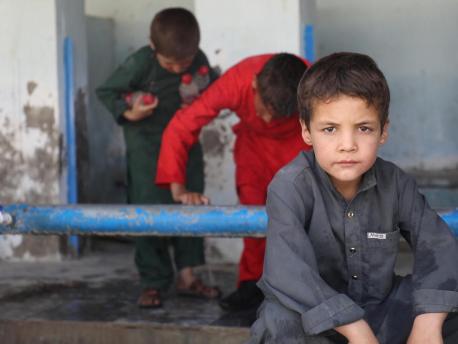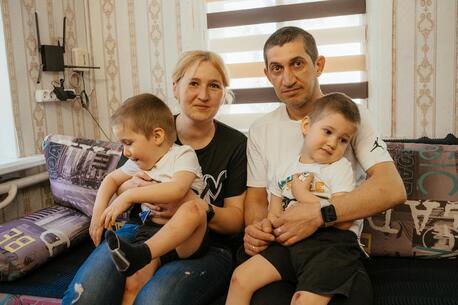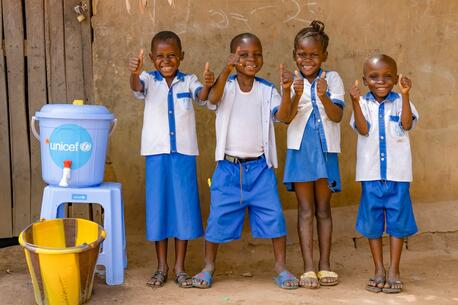
UNICEF Is On the Ground in Afghanistan, Protecting Children and Women
For more than 70 years, UNICEF has been working to promote and protect the rights of children and women in Afghanistan.
Flaring conflict has pushed the nation's child casualty rates to record heights: since the start of the year, 550 Afghan children have been killed and 1,400 injured. Half the population — more than 18 million people, including nearly 10 million children — need humanitarian assistance. From five zonal offices spread out across the country, UNICEF works with partners to deliver lifesaving supplies and services to Afghanistan's most vulnerable. Even in the face of escalating violence, UNICEF's work for Afghan children and families continues.

Since January, more than 300,000 children and their families have been internally displaced in Afghanistan. In the past six weeks alone, around 18,000 people arrived in Kabul. Some families are either renting or being hosted by friends and family, but a growing number are also staying in the open in different parts of the city.

In recent days, more than 400 families fleeing conflict and instability in Kunduz, Sar-e Pol and Takhar provinces have taken shelter in Peer Mohammad Kakar High School in Dasht-e-Padola, southern Kabul. Many arrived with only the bare essentials, in urgent need of humanitarian assistance. Within 24 hours of the families' arrival, UNICEF had set up four tents to provide Child-Friendly Spaces where children in Afghanistan can play and rest — and just be children for a little while.

Half of Afghanistan's population is under the age of 18. Many Afghan children have been exposed to extreme situations of violence and abuse related to conflict and poverty. UNICEF works to protect kids from trauma and to provide them with the stability and support services needed for a healthy childhood.

Above, displaced families gather around a water pump. UNICEF works with partners to ensure that families have access to safe water, basic toilets and good hygiene. In 2020, nearly 122,000 people in Afghanistan gained access to safe water through UNICEF support.

UNICEF mobile health teams were dispatched to provide health care to the pregnant women, mothers and children sheltering at the high school. The teams also provided nutrition support and vaccination services, and distributed family hygiene kits.
Every year, UNICEF works with partners in Afghanistan to provide lifesaving vaccines for nearly 1.2 million children under 12 months — a crucial intervention in a country with one of the world's highest child mortality rates.

All children — including girls — have the right to a quality education. UNICEF works with Afghanistan's Ministry of Education and other partners to support students and teachers, build better education systems and create environments that are conducive to learning and development.

For many years, children in Afghanistan have been growing up surrounded by violence. UNICEF is scaling up its humanitarian response and will continue to deliver much-needed support to the Afghan population, especially those paying the highest price: women and children.
"Despite all the unanswered questions that lie ahead, one thing is certain: UNICEF is here to stay and deliver for every child and every woman in Afghanistan," Hervé Ludovic De Lys, UNICEF Afghanistan Representative, said on August 18. "UNICEF has been here 65 years and we're not leaving."
Top photo: Children displaced by violence fill bottles with water near Peer Mohammad Kakar High School in Dasht-e-Padola, southern Kabul, Afghanistan on August 14, 2021. All photos © UNICEF
HOW TO HELP
There are many ways to make a difference
War, famine, poverty, natural disasters — threats to the world's children keep coming. But UNICEF won't stop working to keep children healthy and safe.
UNICEF works in over 190 countries and territories — more places than any other children's organization. UNICEF has the world's largest humanitarian warehouse and, when disaster strikes, can get supplies almost anywhere within 72 hours. Constantly innovating, always advocating for a better world for children, UNICEF works to ensure that every child can grow up healthy, educated, protected and respected.
Would you like to help give all children the opportunity to reach their full potential? There are many ways to get involved.





